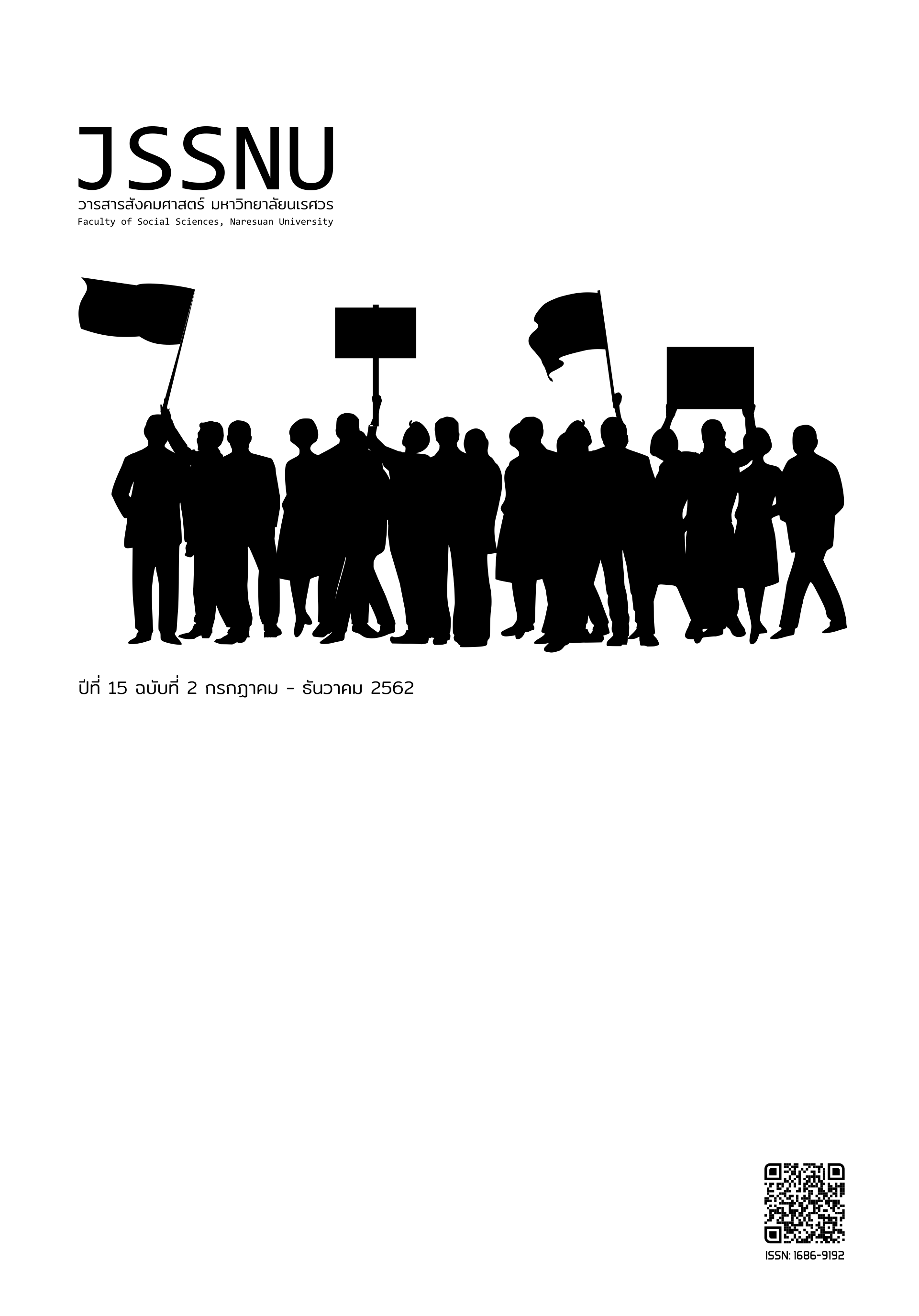More Deduction, More Inequality: The Critique of Tax Deduction in Investment in LTF and RMF
Main Article Content
Abstract
This research article applies Thomas Piketty’s framework to explain the cause of inequality arising from tax deduction in LTF and RMT mutual funds. The results from both ordinary least square (OLS) method and Monte Carlo simulation confirm that the gap between the growth of tax deduction volume and of tax revenue (independent variable) leads to exponential increase in income Gini coefficient (dependent variable). The study shows that an investment in LTF and RMF aggravates inequality in three aspects: (1) it undermines government’s fiscal opportunity for redistribution; (2) relatively high income earners gain benefit from tax deduction more than relatively low income earners; and (3) LTF and RMF holders have a high opportunity in asset accumulation because the return on investment is much higher than the rate of economic growth. This research article suggests that there is a need to shift the discussion for resolving inequality from the issue of progressive tax to the possible implementation of various pro-equality programs.
Downloads
Article Details
References
Credit Suisse. 2018. “Global Wealth Databook Report.” Accessed January 26, 2019 http://www.credit-suisse.com/media/ assets/private-banking/ docs/uk/global-wealth-report-2018.pdf.
Colander, D. 2014. “Piketty’s policy proposal: how to effectively redistribute income.” Real-World Economics Review. 1: 161-66.
Gwartney, J., and Lawson, R. 2006. “The Impact of Tax Policy on Economic Growth, Income distribution, and Allocation of Taxes.” Social Philosophy and Policy, 23(2): 28-52.
Jao,C.C. 2000. “The impact of tax revenue and social welfare expenditure on income distribution in Taiwan.” Journal of the Asia Pacific Economy, 5(1-2): 73-90.
Martorano, B. 2018. “Taxation and inequality in developing countries: lessons from the recent experience of Latin America.” Journal of International Development, 30: 256-273.
Obaretin, O., Akhor, S.O. and Oseghale, O.E. 2017. “Taxation an Effective Tool for Income Re-Distribution in Nigeria.” Mediterranean Journal of Social Sciences, 8(4): 187-196.
Stilwell, Frank J. B. 2005. Political Economy: The Contest of Economic Ideas. New York: Oxford University Press.
Vogel, Steven K. 2019. “Elizabeth Warren Wants to Stop Inequality Before It Starts.” The New York Times, Accessed January 3, 2019. http://www.nytimes.com/2019/01/03/opinion/ elizabeth-warren-economic-policy democrats.html?fbclid =IwAR33Cq4OccosXDLWaE MiWHCQ7gpCoVUsj-oxihRecKJjXwM5YknNXJ30Xbw. Retrieved February 20, 2019.
เอกสารภาษาไทย
โทมัส พิเก็ตตี. 2556. ทุนนิยมในศตวรรษที่ 21. แปลโดย นรินทร์ องค์อินทรี. กรุงเทพฯ: สำนักพิมพ์บางกอกโพสต์
ธร ปีติดล. 2560. เปลี่ยนแปลงอนาคตประเทศไทยด้วยการปฏิรูปภาษี: ข้อเสนอจากโครงการชุมชนนโยบายภาษี. กรุงเทพมหานคร: มูลนิธิฟรีดริค เอแบร์ท ประเทศไทย ร่วมกับสถาบันวิจัยเพื่อการพัฒนาประเทศไทย และ คณะเศรษฐศาสตร์ มหาวิทยาลัยธรรมศาสตร์
ดวงมณี เลาวกุล. 2556. “การกระจุกตัวของความมั่งคั่งในสังคมไทย” บทที่ 2 ใน ผาสุก พงษ์ไพจิตรบรรณาธิการ, สู่สังคมไทยเสมอหน้า การศึกษาโครงสร้างความมั่งคั่งและโครงสร้างอำนาจเพื่อการปฏิรูป, กรุงเทพฯร: สำนักงานกองทุนสนับสนุนการวิจัย สำนักงานคณะกรรมการอุดมศึกษา และ จุฬาลงกรณ์มหาวิทยาลัย.
ปัณณ์ อนันอภิบุตร. 2557. “การปฏิรูประบบภาษีเพื่อสังคมไทยเสมอหน้า” บทที่ 9 ใน ผาสุก พงษ์ไพจิตร (บก.), สู่สังคมไทยเสมอหน้า. กรุงเทพฯ: สำนักพิมพ์มติชน
ผาสุก พงษ์ไพจิตร. 2557. “ความมั่งคั่ง อำนาจ ความไม่เท่าเทียม” บทที่ 1 ใน ผาสุก พงษ์ไพจิตร(บก.), สู่สังคมไทยเสมอหน้า. กรุงเทพฯ: สำนักพิมพ์มติชน
สฤณี อาชวานันทกุล, ณัฐสิฎ รักษ์เกียรติวงศ์, และ วนิชา ดิเรกอุดมศักดิ์. 2557. “ความเหลื่อมล้ำกับตลาดทุนและกรณีหุ้นการเมือง” บทที่ 3 ใน ผาสุก พงษ์ไพจิตร (บก.), สู่สังคมไทยเสมอหน้า. กรุงเทพฯ: สำนักพิมพ์มติชน
สฤณี อาชวานันทกุล. 2556. การปฏิรูปตลาดทุนกับการลดความเหลื่อมล้ำ. กรุงเทพมหานคร: เป็นไท
อธิภัทร มุทิตาเจริญ. 2560. 5 มุมมองใหม่จากข้อมูลผู้เสียภาษีเงินได้บุคคลธรรมดา. บทความใน PIER สถาบันวิจัยเศรษฐกิจป๋วยอึ๊งภากรณ์. สืบค้นเมื่อวันที่ 26 พฤษภาคม 2561. http://www.pier.or.th/?post_type=abridged&p=5096.
อธิภัทร มุทิตาเจริญ และ ผาสุก พงษ์ไพจิตร. 2560. “การวิเคราะห์รายจ่ายภาษีเงินได้บุคคลธรรมดา” ผลงานในโครงการแนวทางการปฏิรูปภาษีเงินได้บุคคลธรรมดาและวิเคราะห์การกระจายรายได้ของผู้มีเงินได้พึงประเมิน ศูนย์ศึกษาเศรษฐศาสตร์การเมือง คณะเศรษฐศาสตร์ จุฬาลงกรณ์มหาวิทยาลัย สนับสนุนโดย สกว.
อารยะ ปรีชาเมตตา. 2561. “ทำไมยังสรุปไม่ได้ว่าไทยเหลื่อมล้ำเป็นอันดับ 1.” จุลสารศูนย์วิจัยความเหลื่อมล้ำและนโยบายสังคม มหาวิทยาลัยธรรมศาสตร์, 1 (สิงหาคม-ธันวาคม).
อุกฤษฎ์ ปัทมานันท์. 2557. “เครือข่ายอำนาจทักษิณ: โครงสร้างอำนาจ บทบาท และพลวัต” บทที่ 7 ในผาสุก พงษ์ไพจิตร (บก.), สู่สังคมไทยเสมอหน้า, กรุงเทพฯ: สำนักพิมพ์มติชน
Translated Thai References
Achavanuntakul, S. 2013. Capital Market Reform and Inequality Reduction. Bangkok: Pen
Thai press.
Achavanuntakul, S., Rukkiatwong, N., and Direk-udomsak, W. 2014. “Inequality in the
capital market and the case of politicians’ stock” Chapter 3 in Phasuk Phongpaichit editor, To the Equally Thai Society. Bangkok: Matichon Press.
Ananpibut, P. 2014. “Tax reform for Thai society, always ahead” Chapter 9 in Pasuk
Phongpaichit Editor, To the Equally Thai Society. Bangkok: Matichon press.
Laovakul, D. 2013. “Concentration of wealth in Thai society” Chapter 2 in Pasuk Phongpaichit Editor, To the Equally Thai Society: the Study of Wealth and Power Structure for Reform, Bangkok: Thailand Research Fund, Office of the Higher Education Commission and Chulalongkorn University press.
Muthitacharoen, A. 2017. New 5 perspectives from personal income tax information. In
PIER article of Puey Ungphakorn Institute for Economic Research. Accessed May 26, 2018 http://www.pier.or.th/?post_type=abridged&p=5096.
Muttitacharoen, A. and Phongpaichit, P. (2017). “Analysis of Personal Income Tax” in the Project of Guidelines for Reforming Personal Income Tax and Analysis of Earners’ Income Distribution by project Prof.Dr. Pasuk Phongpaichit (chief researcher), Center for Political Economics, Faculty of Economics Chulalongkorn University supported by Thailand Research Fund.
Pattamanan, U. 2014. “Thaksin Power Network: Power Structure, Role and Dynamics”
in Pasuk Phongpaichit (ed.), To the Equally Thai Society. Bangkok: Matichon Press.
Phongpaichit, P. 2014. “Wealth, Power, Inequality” in Pasuk Phongpaichit (ed.), To the Equally Thai Society. Bangkok: Matichon Press.
Piketty, T. 2017. Capital in the Twenty-first Century (N. Ong-in-three, trans.). Bangkok: Bangkok post press. (Original work published 2013).
Pitidol, T. 2017. Change the Future of Thailand by Tax Reforming: Proposals from Community Tax Policy Program. Bangkok: Friedrich Abert Thailand Foundation, in collaboration with the Thailand Development Research Institute and the Faculty of Economics Thammasat University.
Preechametta, A. 2018. “Why can’t it be concluded that Thailand is the first in inequality?” The Center for Inequality and Social Policy Research Thammasat University, 1 (August-December).


